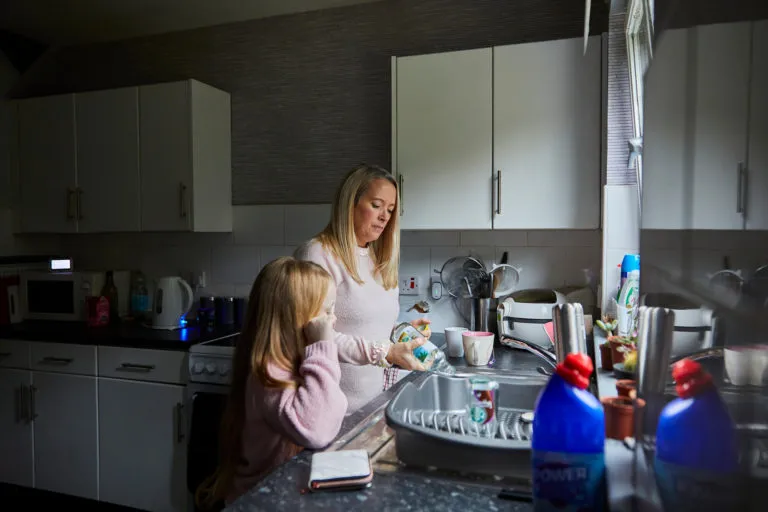Spring Statement: avoiding eviction or eating – the stark choice facing struggling renters with frozen housing benefit
Published: by Deborah Garvie

Fuel bills are skyrocketing, in turn pushing up the cost of food, transport and other family essentials. So, responses to the Chancellor’s Spring Budget have quite rightly focussed on the real terms cut to Universal Credit, which will push 1.3m people below the poverty line.
After all, people having to claim Universal Credit to make ends meet have already cut back to the bone. There are no more savings to be made after it was cut by £20 per week only six months ago. Little wonder that, as well as the indignity of using foodbanks, they’re being driven into the waiting arms of loan sharks.
But what’s often overlooked or misunderstood is the devastating impact that Government housing policy is having on struggling families.
The cost of living crisis is being fuelled by a rental affordability crisis
That’s because the real terms cut (i.e. below inflation increase) in Universal Credit relates to the ‘standard allowance’: the element of Universal Credit paid to help cover the cost of food, bills and a few other essentials. The standard allowance is the minimum amount the Government judges people need for basic subsistence. Families with children receive an additional amount.
The standard allowance isn’t intended to cover rent. Instead, help with rental costs is calculated separately as the ‘housing element’ (still paid as part of Universal Credit). For private renters, the housing element is based on local housing allowance rates.
And local housing allowance rates are simply not covering rents. Average shortfalls between housing benefit and modest rents on a two-bedroom home are now over £10 per week – or £45 per month. To avoid rent arrears, eviction and homelessness, families are having to dip into money that’s supposed to be for food and fuel (the standard allowance, child amounts and/or their low earnings) to pay rent in full.
But try having to use £45 of subsistence money every month just to avoid rent arrears.
In some areas, these shortfalls are much higher. For example, in the ‘red wall’ constituency of Wakefield, shortfalls for three-bedroom family rentals average over £16 per week. That’s a staggering £70 a month!
These shortfalls in local housing allowance are a major reason that so many families are facing a stark choice: avoiding eviction or eating. Parents spend sleepless nights deliberating whether to get into rent arrears, which means children losing their home and the whole family having to move to a cramped room in a homeless hostel (aka temporary accommodation). Or do they pay the rent and end up in deep poverty (e.g. regularly going without meals) to keep the roof over their head.
So, what has the Government done to help struggling renters avoid eviction?
In many parts of the country, rents are rising rapidly. Nationally, private rents are at a record high. Consequently, over a third of private renters, including thousands of working households, now claim local housing allowance.
But local housing allowance rates haven’t been raised to keep up. Instead, the Government’s response has been to freeze them at 2020 levels, meaning growing shortfalls.
So, how do the Government expect people with shortfalls to avoid rent arrears, eviction and homelessness? They can apply for a discretionary housing payment from their council. But, two weeks ago, the Government cut the funding for this by a whopping £40m in a year – a 29% cut.
Housing benefit shortfalls higher than weekly gas costs
On BBC radio on Thursday morning (02:09:50), the Chancellor heard a case study of Sarah, a lone mother of two from Sandwell who relies on benefits. He responded that: “A single mother of two working full time on national living wage, renting, will actually be £1,600 better off a year” as a result of last autumn’s Budget ‘increased generosity’ of Universal Credit and increase to National Living Wage, plus yesterday’s Spring Statement changes.
But what if we factor in the rent and local housing allowance rate? Let’s have a look at what the freeze in the housing element of Universal Credit will mean for a lone mother, living in Sandwell like Sarah. Let’s assume she has a teenage son and daughter, who can no longer share a bedroom, so she needs a three-bedroom private rental.
Sandwell is in the Black Country Broad Rental Market Area, where the local housing allowance falls short of the bottom third (30th percentile) of rents for all sizes of home. The shortfall on three-bedroom homes is £12.66 per week – or £54.86 per month.
| Broad rental market area | Shared | 1 bed | 2 bed | 3 bed | 4 bed |
| Black country | £10.36 | £5.99 | £9.21 | £12.66 | £23.02 |
In her BBC interview, Sarah said she now has to put £45 a week on her gas meter. If she was a private renter in a three-bedroom home, her monthly local housing allowance shortfall of £54.86 is the equivalent of having to go without gas for just over eight days a month. Or, put another way, £12 per week less to spend on the family food shop.
This is the impact our housing affordability crisis is having on the budgets of struggling families.
What’s the answer to avoiding eviction or eating?
On the radio on Thursday the Chancellor said: “I wish I could solve every problem but sadly I can’t”. But he can solve the housing affordability crisis, which is fuelling the cost-of-living crisis.
He can make sure the housing element of Universal Credit is fit for purpose in covering the real cost of rents, so that people don’t have huge monthly shortfalls to cover from their subsistence money.
And he can invest in permanent, decent, genuinely affordable, 21st century social rented homes that would insulate more people against future cost-of-living shocks.